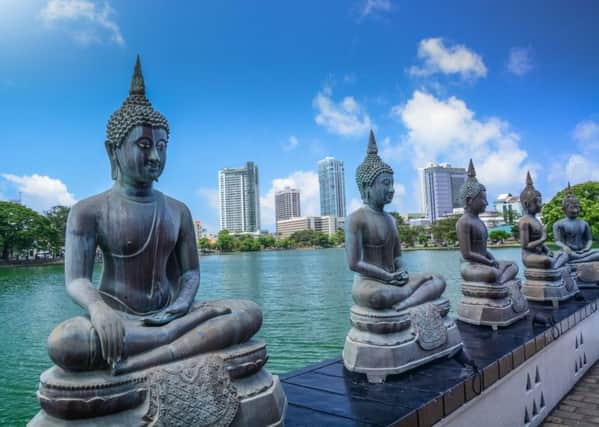Why Google is no substitute for good general knowledge '“ Cameron Wyllie


In the 1960s my older brother Jimmy and I used to go to stay at our paternal grandparents’ house in Menstrie, a village in the foothills of the Ochils in Clackmannanshire. This wee semi-detached cottage had no bathroom, no running hot water and no inside toilet so inevitably we loved it.
Jeannie, our rotund grandmother, really was the stereotypical granny living in a house at the bottom of the woods and spoiled us within her limited means (and beyond them, though that is another story). My grandfather, also Jimmy, was an astonishingly good-looking man with crystal blue eyes; he was a Stalinist for rather longer than was fashionable, and worked at Glenochil, the huge whisky bond, as a foreman, which to my unpractised eye meant he sat and read for a living: he was the only man I’ve ever known who took three novels to work. But he saved a man’s life in a terrible accident, being injured himself into a premature death – another, sadder, story as well.
Advertisement
Hide AdAnyway, Papa Jimmy used to take us for a walk in the woods on a fine day, then return us to the house for our lunch, which always included masses of butter, a substance somewhat rationed in our own home. Jimmy would retire to his chair and read the paper and chain smoke, ashing his fags into an ornate standing ashtray which was an object of great fascination to me and which I eventually inherited.
On these walks, a bit like Uncle Pumblechook in ‘Great Expectations’, Papa Jimmy would ask us questions relating to our general knowledge – the times tables, dates in Scottish history, capital cities of the world. This once led to an argument – of quite heated proportions, because both these Jimmys were obstinate fellows – about the capital of Ceylon. Young Jimmy, probably about 12, knew it was Colombo; old Jimmy, about 60, insisted it was Kandy. At eight, I did not feel well placed to intervene and contented myself with playing with bugs.
General knowledge was part of our lives then; it was part of everyone’s. Twenty years later, in the 80s, as a young schoolteacher, I would always have a quiz book ready in my desk as an end-of-term treat: classes in teams, rounds of questions, sweeties as prizes. Even ‘less academically able’ boys – for this was a boys’ school – knew stuff, random facts about Russia or prime numbers or current affairs.
Thirty years on, at the end of my career, I used to take great pleasure in the success of the school quiz teams; indeed, we even granted our ‘quizzers’ the sacred right of ‘colours’ eventually, so the really successful ones went round the school with blazer badges saying ‘quiz’. No-one but me and other gnarled ancients thought this was remotely strange – that something as ordinary as general knowledge was in our youth had become a specialised extra-curricular activity – you did ‘quiz’ while others played the oboe or threw the discus.
Does this matter? Clearly, the school curriculum has to move with the times and technology means that all of us can get away with knowing less stuff than we used to – when you don’t know something (or, sigh, you forget something) you just Google it. Who is that actress? Who was that king? What, for God’s sake, is the capital of Ceylon, and why is it not called Ceylon anymore, and what can be done to stop brain cells oozing out my ears ...?
I can’t be alone in suppressing a deeply rooted grumble when the nice girl in the shop reaches for a calculator to work out what 10 per cent of £15 is, and then laboriously subtracts £1.50 from £15 etc etc. But, does it matter?
Advertisement
Hide AdWell, it must a bit. If you don’t know that you need to know something, then you can’t Google it. Lots of information that was reasonably common currency simply isn’t there in the minds of young people and has been replaced by different skills, of which they have many.
However, if you are, for example, teaching a text that refers directly or indirectly to something else – the mention of Icarus in a poem by W H Auden, say, and the clever children in your Higher English class don’t have a scoobie who Icarus was, then they are, quite clearly, not able to understand the poem.
Advertisement
Hide AdAgain, in the great scheme of things, this may not matter very much, but, if we do not have things to connect, then E M Forster’s much-quoted dictum “only connect” cannot happen; some intellectual breakthroughs just require two bits of factual knowledge to be laid side by side.
All of this may just be a reaction to skills-based learning. Someone who did O-grade history in the 60s or 70s just would not recognise a National 5 paper today and I suspect that most history teachers would say that these changes are entirely right.
I honestly think there is validity in both approaches, but I’m afraid I also have a little feeling in my tummy that says that knowing more things is one of the proofs that you are grown up.
Which is maybe why old Jimmy tried to see off young Jimmy on a path through the woods in Menstrie many, many years ago.
Cameron Wyllie, a retired headteacher, publishes a blog called A House in Joppa
